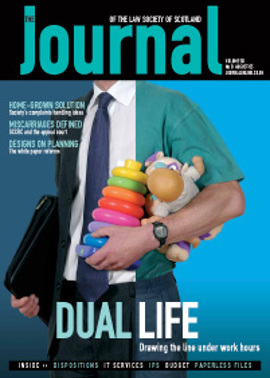Advice for all, but what about justice?
It goes without saying that Hugh Henry’s job as Deputy Justice Minister is to look for better ways to deploy legal aid money. His interview in last month’s Journal illustrated the Executive’s resolve to develop a strategic approach to civil and criminal legal aid and advice and assistance. All solicitors will support that aim.
But moving legal aid money around will not deliver better access to justice on its own. If the “Advice for all” review is to improve access to justice, the Executive needs to open its mind to wider and co-ordinated reform. Here are some ideas.
Money is a prime source of civil dispute. In 1998 the Lord Advocate estimated that 76% of all sheriff court actions were debt actions for less than £1,500. In most the debt will not be denied so there is no legal dispute. If all these cases were remitted to a debt tribunal, sheriffs would have more time for justiciable issues. Delays in the civil and criminal courts could be substantially cut.
A debt tribunal could be informal and accessible. It could work out repayment plans for multiple debt, and freeze interest to enable repayment without resorting to sequestration. Instead, Scotland now has a Debt Arrangement Scheme (DAS). Millions of pounds have been invested in an initiative only accessible through an “accredited money advisor”. There are only 29 advisors listed on the www.money.scotland.gov site, none of them in Glasgow. Advice for all?
Housing is another major source of legal dispute. The Housing (Scotland) Bill creates a new Private Rented Housing Panel to provide tenants with a quick and straightforward remedy to get repairs done. The law in Scotland has been unable to force landlords to implement important repair obligations. So the Executive has come up with a solution, which is then promptly restricted to the private rented sector. This represents about 6% of all households in Scotland. Why not extend it to another 27% by including the social rented sector?
If the Executive is really serious about improving access to justice it must co-ordinate all of its policies. The Executive has a number of “cross-cutting” strategies. Perhaps it is time to introduce a cross-cutting “equality of access to justice” strategy? Every policy could be tested to make sure it complied with equality of access to justice principles. If that approach were adopted, flaws in initiatives like the DAS would have been picked up on the drawing board.
Hugh Henry says if there are non-lawyers “who are better placed to give advice and assistance they should be allowed and encouraged to do that”. Let’s go much further. Preventative early advice can avoid complex disputes. When someone goes into a CAB they see a volunteer who will look up a large advice database. That database is paid for by the taxpayer but is not directly available to the public. Why?
Let’s break down barriers which protect organisational self-interest and make all information and advice systems public. There should be no passwords for e-information paid for by the taxpayer. Instead of waiting a few hours to see a volunteer in a CAB, a person would have the choice of finding an online answer. Information sites could make more use of proforma letters and styles so that citizens could resolve problems earlier and more easily.
Some people will always need to see an adviser or solicitor because of the complexity of their dispute, or personal vulnerability. The Executive must be careful not to exclude those on modest incomes from access to a solicitor because it wants to use a less qualified and cheaper alternative. Social inequalities need to be eradicated, not perpetuated. Hugh Henry has talked about access to advice for all, but what about access to representation?
By and large lawyers are very good at representation and advocacy. People should not be forced to use untrained advisers because the state will not pay for a skilled lawyer. Where a person’s health, home, family, income or liberty is under threat they should always have access to legal representation as a fundamental human right. That will generally be a lawyer. On the criminal defence side there needs to be a realistic costing of the Public Defence Solicitors’ Office in order for private practitioners to compete. Without genuine competition we may lose innovation.
Few would argue that the Scottish Legal Aid Board’s strength is in directly employing solicitors to provide legal services. There is also a danger in making the Board bigger and more bureaucratic. Large publicly-funded organisations have a tendency to get lost in self-perpetuating exercises. For example, most of the Board’s recent changes to legal aid forms resulted in less accessibility and less efficiency. Quality assurance measured in box ticking is not the means to improve legal services.
We can make money go further, but unless we have a wider cross-cutting review the difference may be negligible.
In this issue
- Prosecuting bigotry offences
- A hotter than average July
- Advice for all, but what about justice?
- Calling time
- The anti-avoidance drive
- The best option?
- Radical design
- Miscarriages of justice
- Information technology
- IPS... keeping a watchful eye
- When less means better
- Reality check - not Big Brother
- A clear duty
- Missing a generation
- Does age matter?
- Fair picture?
- Book debts: the final word?
- Website reviews
- Book reviews
- Challenging the sacred cows of conveyancing






